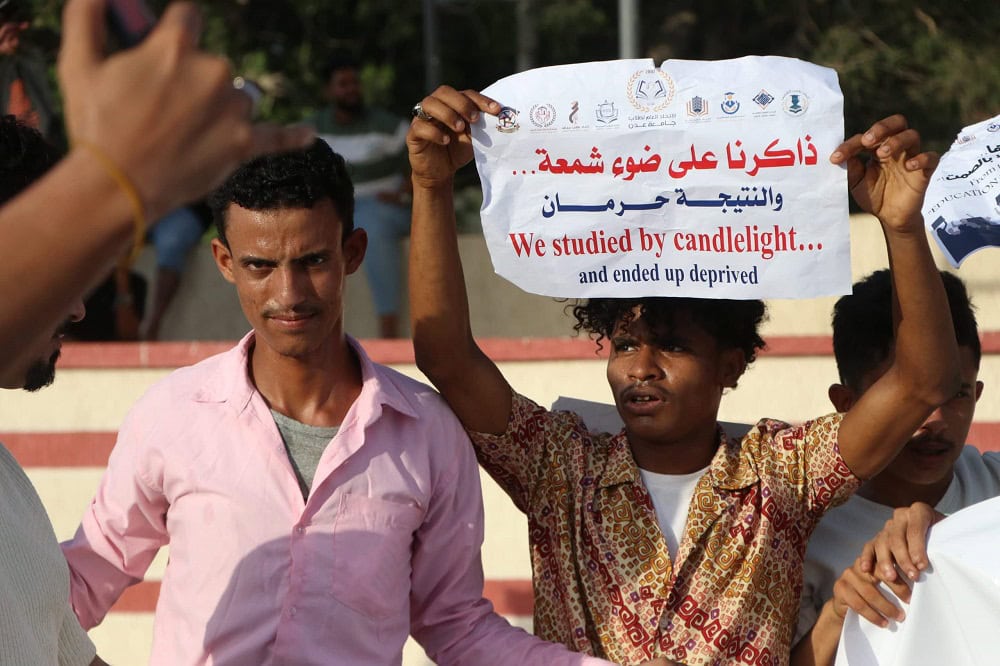
Students of University of Aden protest in Al-Arood Square in the city of Aden, calling for the resumption of academic activities. May 17, 2025 (Aden University Students’ Union Facebook page)
10-06-2025 at 2 PM Aden Time

|
|
Reem Al-Fadhli (South24)
In early December 2024, the Southern Teachers’ Union announced a full-scale strike after the Yemeni government failed to pay salaries for two months in a row.
The decision, which the union described as a “forced measure”, has led to the complete paralysis of the educational process in schools in the capital, Aden, and a number of nearby governorates. Students abandoned the academic year 2024-2025 without being able to complete even a quarter of the curricula. The strike is an extension of a series of protests carried out by teachers in the past years.
The main reason for these strikes is the sharp decline in the value of the teachers’ salaries paid in Yemeni riyal, which is witnessing a record decline against foreign currencies (1 US dollar =2250 riyals). This means that the teachers' salaries now range between just 30-50 dollars per month, which is nearly 90% less than its value prior to 2015.
The crisis hasn't been limited to just state-owned schools, but has extended to other universities in the governorates of Aden, Abyan, Lahij, and Shabwa where the staff unions announced a comprehensive strike to demand the settlement of their financial and administrative dues. As a result, the public and university education sector in South Yemen has entered a state of deadlock amid the lack of any radical measures by the relevant authorities.
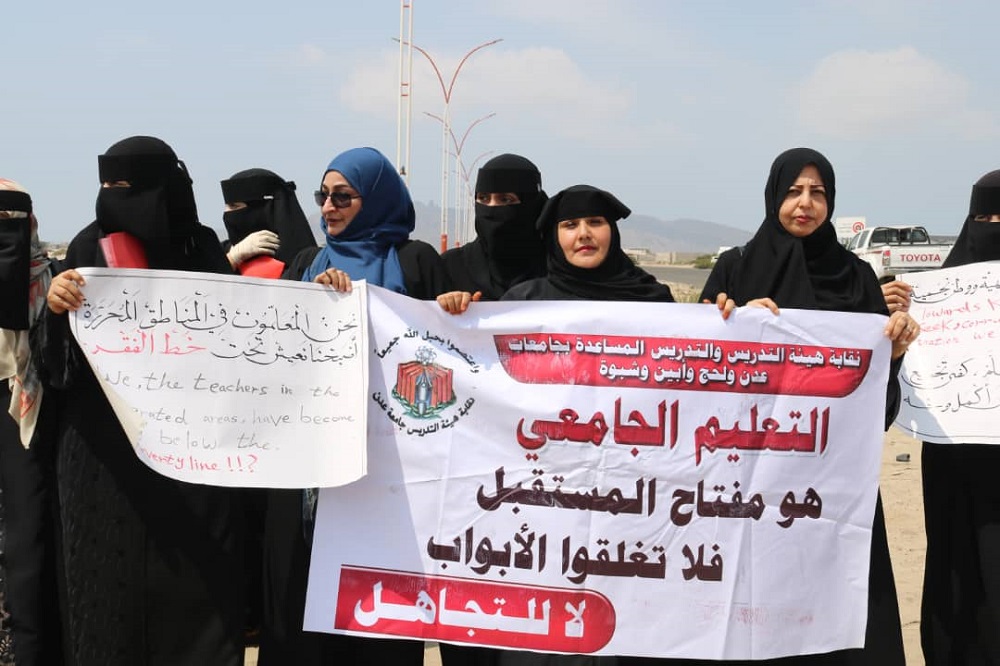
A protest by the staff union of the universities of Aden, Lahij, Abyan, and Shabwa, April 14, 2025 (For ‘South24 Center’ by the union).
The strike affected all the schools in the capital Aden, with no exception, but it was carried out sporadically in schools in Lahij, Abyan, Shabwa, and Hadramout. However, Al-Mahra did not witness any strike.
The Strike will Continue till Demands are Met
Abdullah Algomairi, Head of the Southern Teachers Union, told ’South24 Center’ that “the strike will continue until the government fulfils all the legitimate demands of the teachers. This step isn't new but a continuation of our efforts since 2013.”
He added: “The union has been repeatedly contacting the heads of all successive governments over these years, but we haven't received any real response so far.” He believes that this neglect reflects a desire to "keep generations ignorant”.
He stressed that ”the strike is a legal right of teachers”, and added that, “the union isn't affiliated with any political parties as alleged but is an independent entity aiming to defend teachers’ rights and improve the level of academic achievement.”
This focus on keeping the union strictly independent is also confirmed by Belaid Saleh, spokesperson for the staff and employees’ unions of the universities of Aden, Lahij, Abyan, and Shabwa. He noted that the joint coordination between his union and the Southern Teachers Union led to the formation of a unified escalation committee.
He told ’South24 Center‘: “The suffering is the same and we have common demands. We work collectively to organize activities and events to unify the union voice and enhance the institutional and media pressure on the relevant authorities.”
Universities on Strike
The state-owned universities joined the strike by schools when the faculty unions of the universities of Aden, Lahij, Abyan, and Shabwa announced their participation in a comprehensive strike in December 2024. The decision came after years of economic decline that undermined the position of university professors, rendering it impossible for them to carry out their educational and research duties.
Belaid Saleh emphasized that this decision “hasn't been an easy choice nor is it a temporary step. It is rather the inevitable outcome of the exacerbating suffering beyond the limits of human endurance”.
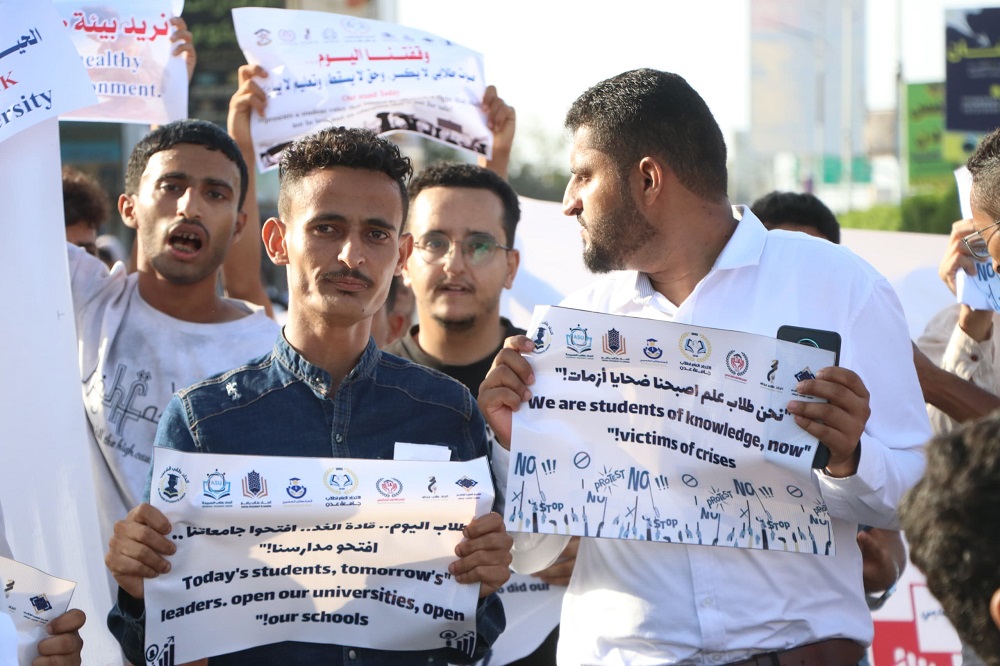
Students of University of Aden during a protest in Al-Arood Square in Aden, calling for the resumption of academic activities, May 17, 2025 (Aden University Students Union Facebook page).
He added: “This decision is painful and a result of years of economic decline and suspicious governmental neglect, which has led to a shocking erosion of our salaries. The actual value of our salaries has decreased to 9% while 91% has been lost due to the currency collapse and loss of purchasing power.”
This tragic livelihood situation is also expressed by Dr. Ashjan Al-Fadhli, Head of the Social Studies Department at the Faculty of Education, University of Aden. She said that university professors are no longer able to meet the needs of their families or continue their work in the best way.
She told ’South24 Center‘: “Before the war, an assistant professor at the university earned 2000 dollars per month. Today, their salaries don't exceed 100 dollars. This deterioration has directly impacted their ability to perform their scientific duties.”
Al-Fadhli pointed out that university professors “no longer have the financial means to travel to the university regularly or continue with conducting and publishing scientific research. They have family commitments and face major difficulties in meeting the needs of their families.”
She pointed out that university faculty are faced with two bitter choices: “insist on demanding their rights or worry about wasting students’ educational opportunities, especially those in the final years, whose graduation may be delayed for one year due to the stoppage of education’’.
Despite the strike continuing in some faculties in Aden, Lahij, and Abyan, not all faculties were committed to it. For example, while the faculties of Law, Engineering, and Economy at the University of Aden remained on full strike, other faculties witnessed partial adherence or resumed their work. The faculties of Languages and Pharmacy did not join the strike due to their financial needs as they benefit from the high fees in US dollars paid by parallel and private students. This has weakened the unity of union pressure.
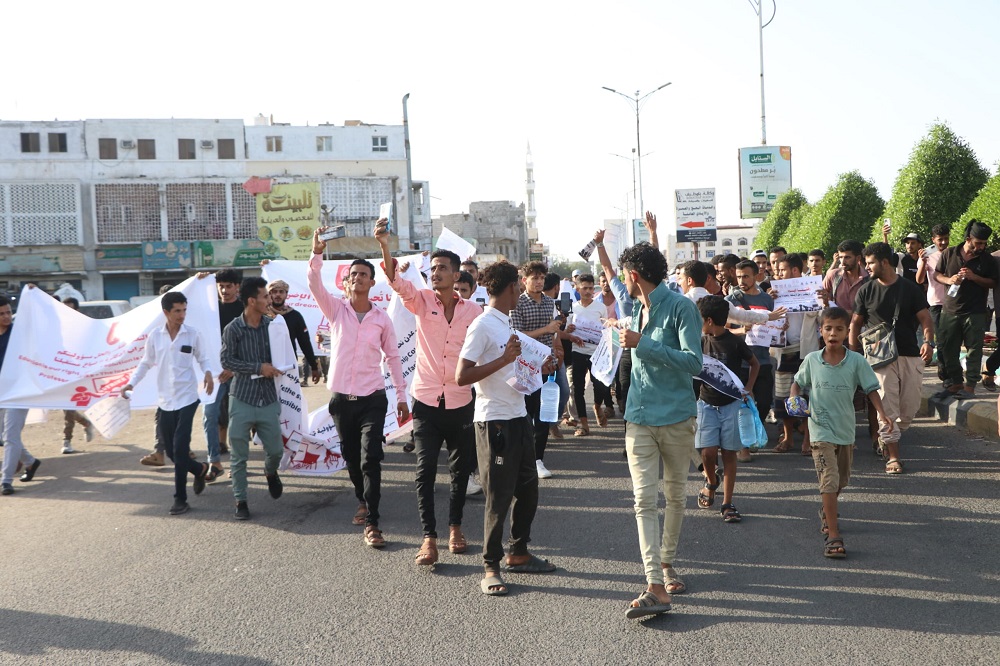
University of Aden students during a protest in Al-Arood Square in Aden, calling for the resumption of the education process, May 17, 2025 (Aden University Students Union Facebook page).
Belaid Saleh stressed that the University of Lahij has been the most committed to the strike while the University of Abyan witnessed a significant decline after four of its faculties exited the strike. The strike was not launched in the University of Shabwa. He added: “Breaking the strike in some faculties in Aden was motivated by the need for money. Teaching assistants were recruited after the Eid holiday in the colleges that broke the strike.”
On the other hand, some students have taken an opposing stance to the strike. President of the Aden University Students Union, Yahya Al-Tabaqi, expressed his concern at the disruption of the educational process.
He told ’South24 Center‘: “We understand the union’s demands in light of the economic deterioration. However, students are paying the price for these repeated strikes, especially as the repercussions of the two previous strikes are still impacting the academic path.”
He pointed out that “the lack of any concrete government measures to tackle the situation has exacerbated the impact of the strike. There are no initiatives in place to limit the damage, especially regarding educational standards and the curriculum backlog”.
Despite expectations that university education would resume after the Eid Al-Fitr holiday (April), students were taken aback by the indefinite prolonging of the strike. Al-Tabaqi said that this “has placed the heaviest burden on the University of Aden in comparison to universities in neighboring governorates”.
He called on the Presidential Leadership Council (PLC) and the government “to intervene quickly to salvage what remains of the students' future”. He also called on the union to suspend the strike and “seek alternative strategies that don't make the students victims of a conflict to which they aren't a party”.
Absent Government and Deferred Solutions
Despite the widening nature of the strike and the near-complete halt of education in South Yemen, the government has failed to contain the crisis or propose practical solutions that ensure a minimum level of stability for teachers and academics. Official statements have varied between justification and unfulfilled promises.
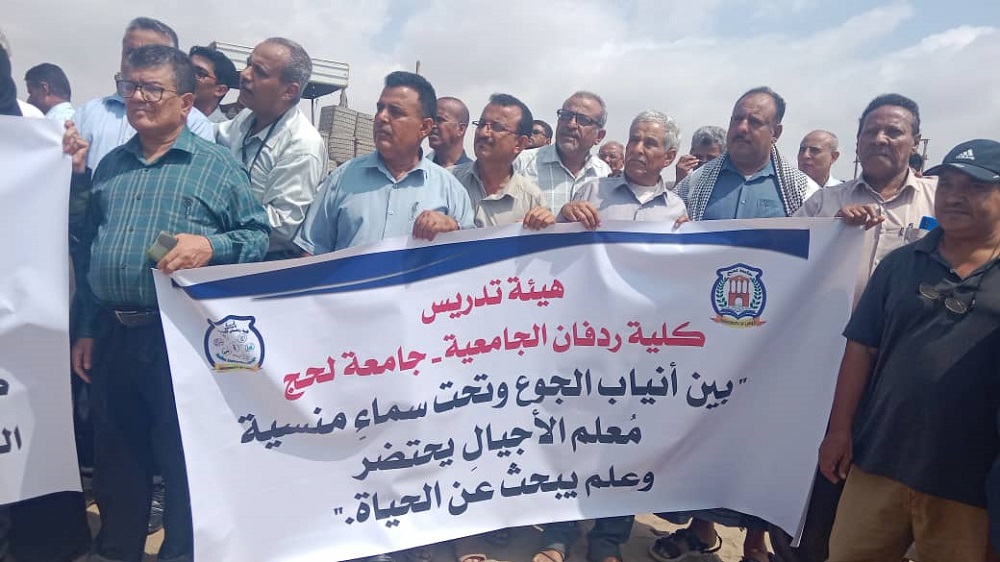
A protest by the staff union of the universities of Aden, Lahij, Abyan, and Shabwa, April 14, 2025 (for ‘South24 Center’ by the union).
Deputy Minister of Education, Dr. Ali Bin Ali Al-Abbab, acknowledged the gravity of the situation to ‘South24 Center’, stating that the war in Yemen has led to a sharp educational crisis. He highlighted that, “the cessation of oil exports and the economic deterioration have negatively impacted education, leading to the stoppage of teachers' salaries and a drastic shortage in the sector's operating budgets”.
He stressed that “text books alone require 28 billion riyals but the available money is only 2 billion riyals”.
In an attempt to reassure teachers, Dr. Al-Abbab disclosed that a meeting was held between Minister of Education Tariq Al-Akbary, former PM Ahmed Bin Mubarak, and a number of ministers, in which some measures were agreed upon.
The agreed measures included “the establishment of an education support fund; disbursing of teachers’ salaries every month; settlement of outstanding financial dues from January 2025; and working on issuing the necessary rulings by the Ministry of Civil Service.”
He stated that while the current conditions have heavily impacted the quality of the educational process, the ministry is trying to improve outcomes despite the enormous challenges.
For his part, Mohamed Lamlas, Undersecretary of the Ministry of Education for the Education Sector, explained that the local authorities and the ministry haven't kept silent, but directly contacted the Teachers Union and their representatives, through educational media, the Ministry’s online platforms, and social media pages.
He added: “We quickly paid financial incentives to teachers to alleviate their suffering. We have sought, in coordination with the ministries of Civil Service and Finance, to release the delayed annual bonuses, finalize settlements, and disburse the related financial dues.”
Lamlas emphasized that the local authorities support the legal demands of teachers. However, he urged them to take into consideration the students’ right to education as they represent the future of the country.
He said: “We call on teachers to respect the right of students to receive education and knowledge under any circumstances. We also urge parents to encourage their children to enroll in schools and support the educational process through active participation in parents' councils.”
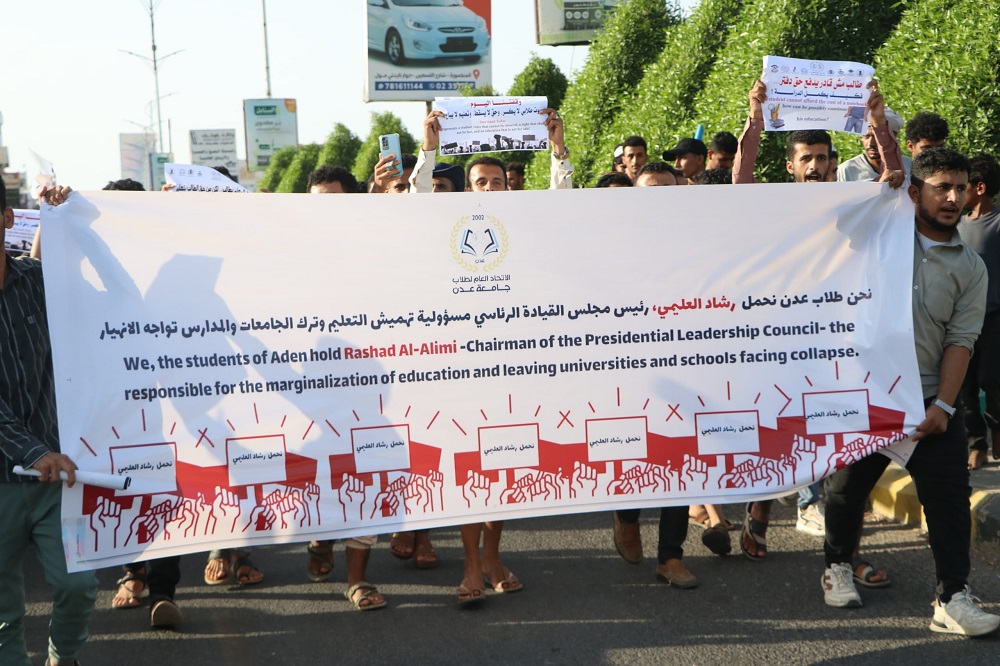
University of Aden students during a protest in Al-Arood Square in Aden, calling for the resumption of the education process, May 17, 2025 (Aden University Students Union Facebook page).
However, teaching unions no longer trust these promises and messages by the authorities. Abdullah Algomairi, Head of the Southern Teachers Union, believes that “these stopgap solutions proposed by officials are futile. They are rejected unless they include all the union's demands.”
Belaid Saleh highlighted that the lack of governmental engagement reflects an indifferent, if not a dubious stance. “This silence reveals an undeclared agenda to destroy education and exclude teachers and academics from any developmental or civilized future.”
In light of this deadlock, educational authorities, despite the strike, decided to hold transitional ministerial exams. On May 4, students in Aden and other governorates went to take their exams even though many of them had not completed the prescribed educational curriculum.
Basma Mohammed, Director of the Model School for Girls in Mansoura District, told ‘South24 Center’ that “the educational process resumed in March, and teachers in the final stage of secondary school were able to complete the first semester curriculum, in addition to only about 10% of the second semester curriculum”.
What are the Solutions?
Dr. Mohammed Lamlas emphasized that “addressing the educational loss is one of the major challenges currently facing the Education Ministry. The ministry seeks to compensate students for the missed academic units by integrating them into the curriculum for the next academic year”.
He called on the government to “reconsider its policies toward the education sector”, stressing the “need to grant teachers benefits that ensure a decent life”.
He added: “We call for establishing a special structure for salaries that guarantees a decent life for teachers, helping them to give their best with sincerity, and honesty. Salaries should be paid regularly. New appointments should be made annually. And in addition, providing them special privileges like health insurance as well as improved social and professional conditions.”
Dr. Al-Abbab explained that despite the Ministry of Education’s poor financial capabilities, it continues striving to implement its plans through collaboration with international bodies.
He concluded: "We are striving diligently to carry out our plans in cooperation with international organizations such as UNICEF, UNESCO, the World Bank, the Global Partnership Group, and others, to implement our projects related to building schools, providing incentives, training educational staff, and establishing modern information systems."
However, he stressed that implementing this strategy requires significant financial support and the adoption of dedicated budgets which haven’t been achieved yet.
Amid this complicated reality, the educational process in South Yemen appears to be at a dangerous crossroads. Schools and universities, which once served as a beacon of hope for a generation yearning for change, have now become an arena for a chronic crisis. In this, the legitimate demands of teachers are getting crushed amid clear governmental apathy, while students are the ones who pay the biggest price regarding their future.